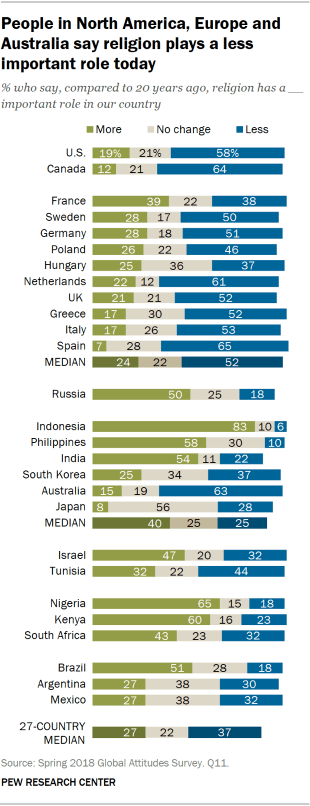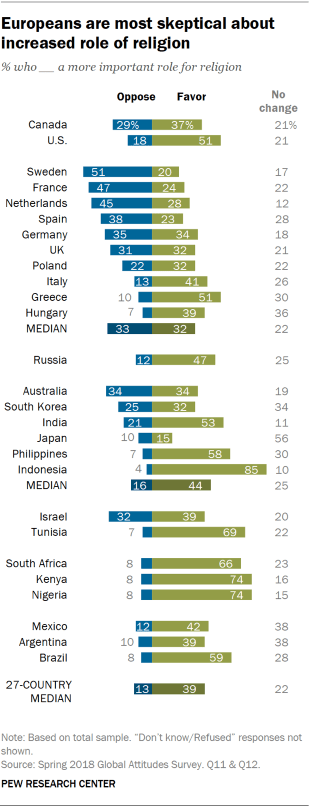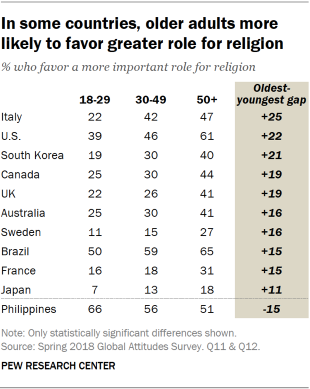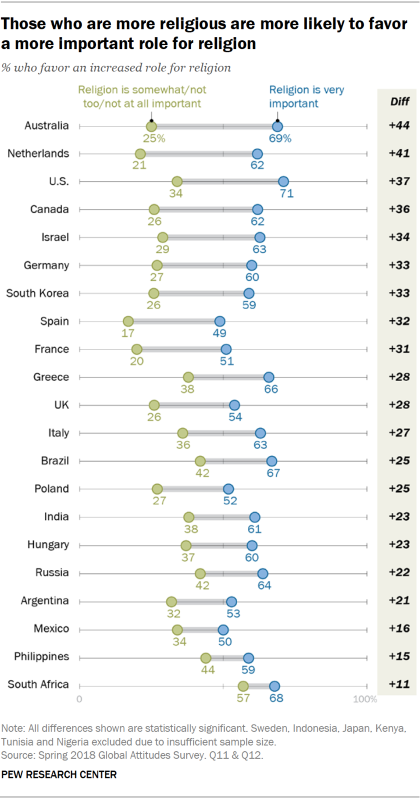 Recent studies document younger adults being less religious than older generations and the global religious profile changing as the population grows. Across 27 countries surveyed, more think religion plays a less important role than a more important role compared with 20 years ago, but there is substantial regional variation on this question. About two-in-ten say there has been no change.
Recent studies document younger adults being less religious than older generations and the global religious profile changing as the population grows. Across 27 countries surveyed, more think religion plays a less important role than a more important role compared with 20 years ago, but there is substantial regional variation on this question. About two-in-ten say there has been no change.
North American and European publics are especially likely to see religion playing a diminished role in recent times. Majorities in both the U.S. (58%) and Canada (64%) say religion has a less important role than it did 20 years ago. Roughly half of Europeans surveyed (a median of 52%) say religion plays a less important in their country. The French public is split on this question, with 38% who say religion plays a less important role and 39% who say it has a more important role today. Overall, only about two-in-ten Europeans say there has been no change in the role of religion over the past 20 years.
Adults in the Asia-Pacific region are split on the role religion has to play in their societies. More than half in Indonesia (83%), the Philippines (58%) and India (54%) believe that religion has a bigger impact on their nation today than it did 20 years ago. Seven-in-ten or more in all three of these nations say religion is very important in their lives, which is related to views about the importance of religion. (See Overview for more on the connection between responses to the question of religious importance and whether religion has a more important role to play.) However, in South Korea, Japan and Australia, people tend to say religion has become less important or there has been no change.
Meanwhile, a 65% majority in Nigeria thinks religion plays a more important role in their country, while 60% of Kenyans say the same. Notably, large majorities in these countries (96% and 93%, respectively) say religion is very important in their lives.
Education level plays a role in how some sub-Saharan African and Latin American respondents evaluate the importance of religion. Across these two regions, adults with more education are less likely to say religion plays a more important role than it did 20 years ago. This educational divide is particularly pronounced in Brazil, where there is a difference of 15 percentage points, Nigeria (14 points) and Argentina (12 points).
 Globally, more favor than oppose an increased role for religion
Globally, more favor than oppose an increased role for religion
Around the world, more favor an increased role for religion in their countries than oppose it. A median of almost four-in-ten (39%) are supportive of this change. A median of just over one-in-ten (13%) are opposed to the increasing role of religion, but this can mask particular concern in Europe, where sentiment about the role of religion is mixed.
Roughly one-third of adults in Europe (median of 32%) favor a more important role for religion, while a similar percentage (33%) are opposed. About half of Swedish adults (51%) are particularly concerned about the more important role of religion, as well as 47% of French adults and 45% of the Dutch.
Publics in other regions of the world are generally more favorable of a more important role for religion, including 51% in the U.S.
A median of 44% across the seven Asia-Pacific countries polled favor a greater role for religion in their nations. This view is especially prominent in Indonesia (85%), the Philippines (58%) and India (53%). The big exception in the region is Australia, which is divided on the role of religion in their society.
There is high approval for an increased role for religion in the sub-Saharan African countries surveyed. Almost three-quarters in Kenya and Nigeria (both 74%) favor an increased role of religion. And about two-thirds of South Africans also favor a more important role of religion.
In Nigeria, there are also significant differences on this issue between the views of Nigerian Muslims and Christians. The vast majority of Nigerian Muslims (88%) are in favor of a more important role for religion, while a smaller majority of Christians (61%) say the same. However, it’s important to note that roughly a quarter of Christian respondents (26%) say there has been no change in the relative importance of religion in Nigeria, compared with 5% of Nigerian Muslims.
 Elsewhere, roughly seven-in-ten Tunisian adults (69%) favor an increased role for religion. But in Israel, only 39% welcome a greater role for religion in their country, while 32% are opposed to that change. Among the nations surveyed in Latin America, a majority of Brazilians (59%) favor a more important role for religion, while support is lower in Mexico (42%) and Argentina (39%).
Elsewhere, roughly seven-in-ten Tunisian adults (69%) favor an increased role for religion. But in Israel, only 39% welcome a greater role for religion in their country, while 32% are opposed to that change. Among the nations surveyed in Latin America, a majority of Brazilians (59%) favor a more important role for religion, while support is lower in Mexico (42%) and Argentina (39%).
Older adults are more supportive of a more important role for religion in 10 countries. The biggest age difference is in Italy, where there is a 25 percentage point gap between older and younger Italian adults.
But this age gap also exists in both Canada and the U.S., where there are gaps of 19 and 22 percentage points, respectively, between those ages 18 to 29 and those 50 and older.
The notable exception to this trend is the Philippines, where young adults are 15 points more likely to approve of an increased role for religion.
 Globally, those who say that religion is very important in their lives are especially in favor of a major role for religion in society. In Australia, for instance, 69% of those who say religion is very important favor a larger role for religion in society, compared with just 25% among those who say religion is less important in their lives.
Globally, those who say that religion is very important in their lives are especially in favor of a major role for religion in society. In Australia, for instance, 69% of those who say religion is very important favor a larger role for religion in society, compared with just 25% among those who say religion is less important in their lives.
It is difficult to conduct a reliable analysis of statistical significance in countries where the vast majority of respondents are concentrated at one end of the question of how important religion is to them. In a handful of countries, there are not enough people in the “very important” or “somewhat/not too/not at all” categories to accurately test for significance. For example, so many survey takers in Indonesia, Kenya, Tunisia and Nigeria say religion is very important to them that there is a lack of respondents who say religion is “somewhat” or “not too” important. The reverse is true in countries with less religious publics. An overwhelming majority of Swedish and Japanese respondents say religion is less important to them.


